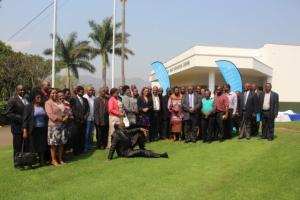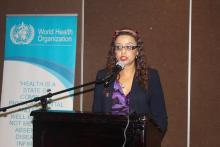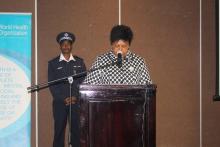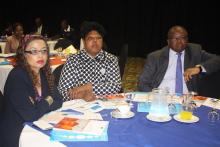Swaziland orients parliamantarians on health issues
22 September 2015 - Swaziland held a 2 days meeting to orient parliamentarians on topical public health issues in the country. The parliamentarians were oriented on the Universal Health Coverage concept which is the main theme of the National Health Sector Strategic Plan 2014-2018. They were also oriented on tobacco control in the country. The meeting also included discussions on addressing social determinants of health as well as the burden of non-communicable diseases, neglected tropical diseases and malaria in the country. This very important meeting was held at Royal Swazi Hotel in Ezulwini from 21 to 22 September 2015.
In attendance were the Honourable Minister of Health, Senator Sibongile Ndlela Simelane, Members of Parliament, senior Ministry of Health and other Government officials. The United Nations family was represented by the Acting WHO Country Representative, Dr Tigest Ketsela Mengestu, the UNFPA Country Representative Ms Sharareh Amirkhalili and officers from the WHO Country Office. WHO provided both financial and technical support during the meeting. Dr William Onzivu from WHO Regional Office led the discussions on tobacco control.
Dr Tigest Ketsela expressed WHO’s commitment to Universal Health Coverage emphasising the fact that universal coverage is the single most powerful concept that public health has to offer. “The theme of the National Health Sector Strategic Plan 2 which is ‘Towards attainment of Universal Health Coverage’ needs to be unpacked so we can all understand what it means for Swaziland. We thank our Honourable Minister of Health for finding it right to gather all of us here and discuss this as it relates to the country’s health system” she said. She also commended His Majesty the King, for asserting the Tobacco Products Control Act of 2013 and called for enforcement of the Act in line with the Framework Convention on Tobacco control .
The Principal Secretary in the Ministry of Health, Dr Simon Zwane presented on the National Health Sector Strategic Plan which is operating on principles of social accountability, evidence and justice, people-centeredness, equity, multi-sectoral engagement, participation and efficiency. The plan aims at building an efficient and equitable client-centred health system for accelerated attainment of highest standard of health to all people in Swaziland. The overall goal is to move towards attainment of Universal Health Coverage with defined health services. It is based on five thematic health service areas including, promoting health through the life course, prevention of diseases, prompt and effective management of medical and related conditions, rehabilitation following health events and influencing health actions in key related sectors. These thematic areas are operationalized according to the six health systems strengthening building blocks (service delivery systems, health workforce, health information, health products, health infrastructure and governance and regulation). Mrs Khosi Mthethwa from the WHO Country Office gave a detailed overview of the Universal Health Coverage concept.
To achieve national vision of Swaziland attaining first world status by the year 2022, a wider action on Social Determinants of Health and focusing on the Sustainable Development Goals is needed. The Deputy Director in the Ministry of Health, Ms Rejoice Nkambule led the discussions on this issue. She stressed that health is not just the outcome of genetic or biological processes but it is also influenced by the social, economic, political and environmental conditions in which we live. Addressing social determinants of health requires concerted and coordinated action with strong political leadership at family, community, and national levels. There is also need for intersectoral action. Health alone cannot achieve a healthy society. Communities need to be empowered to get involved in their own health, promoting healthy lifestyles. There is need for formulation of healthy public policy, healthy policies in all sectors emphasizing on promotion and prevention.
Swaziland is a party to the WHO Framework Convention on Tobacco Control having signed it on the 29th June, 2004 and ratified the same on the 13th January, 2006. Dr Onzivu presented on the main provisions of the convention. He was supported by the Focal Point for the Convention, Mr Vuyile Dlamini. They discussed how to identify and respond to tobacco industry interference. Tobacco use is one of the major risk factors for Non communicable diseases (NCDs). There was a presentation on the results of the Stepwise Approach to NCDs surveillance study conducted in the country in 2014. The survey focused on tobacco use, harmful use of alcohol, unhealthy diet, physical inactivity, raised blood pressure, raised total cholesterol, raised blood glucose, overweight and obesity, screening for cervical cancer, mental health, oral health and violence and injury.
The findings triggered a discussion which called for continued clear positioning of NCDs as priority within the national development agenda ; promotion of Health-in-All-Policies and Whole-of-Government approaches to implement the National NCDs Action Plan and other global recommendations; supporting innovative financing mechanisms for NCDs prevention and control - special tax on alcohol, tobacco, road use etc; development and enforcement of legislation addressing the major risk factors for NCDs– tobacco, unhealthy diet, alcohol; the private sector to contribute to NCD prevention and control as well as Development Partners to support multisectoral action through effective partnership.
Swaziland also conducted a mapping survey for schistosomiasis and soil transmitted helminthiasis in February 2014. It was a countrywide survey covering all the 55 districts (Tinkundla) , 275 primary schools with a total 13 750 learners aged 10-14 years .The national prevalence of Schistosomiasis is 15.7%. The prevalence of Soil Transmitted Helminthiasis in Swaziland is 5.8%. A plan was shared to implement interventions like mass drug administration, health education, sanitation improvement and environmental manipulation to eliminate these diseases by 2025.
Swaziland is pursing a Malaria elimination agenda through the implementation of the 2015-2020 malaria elimination strategic plan. For malaria elimination to be achieved ownership must be taken by both the general public and Swaziland’s leaders at all levels. Parliamentarians play a critical role in malaria elimination, as leaders who are elected to serve communities where malaria persists and must take the lead for elimination to be achieved.
The parliamentarians were very grateful to WHO for supporting such an important meeting.
____________________________________
Below:
01 The Acting WHO Country Representative Dr Tigest Mengestu making her remarks
02 The Honourable Minister of Health, Senator Sibongile Ndlela-Simelane making her remarks
03 The Acting WHO Country Representative, the Honourable Minister of Health, and the Speaker of Parliament Mr. Themba Msibi following proceedings



